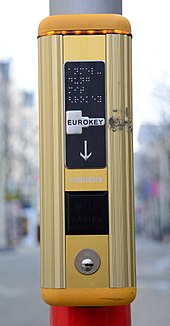Euro key

Euro key (German: Euroschlüssel) is a locking system which enables people with physical disabilities to access facilities free of charge:[citation needed] for example disabled-accessible elevators and ramps, public toilets on motorways, at train stations, in pedestrian zones, shopping centers, museums, public authorities etc. It was introduced in 1986 by the CBF Darmstadt (Club Behinderter und Freunde) in Darmstadt and environs.[citation needed]

The Euro key is now widely used throughout the following European countries: Austria,[citation needed] Bulgaria,[citation needed] Czechia,[citation needed] Denmark,[citation needed] Finland,[citation needed] France,[citation needed] Germany,[citation needed] Italy,[citation needed] Liechtenstein,[citation needed] Norway,[citation needed] Portugal,[citation needed] Romania,[citation needed] Slovakia,[citation needed] Spain,[citation needed] Sweden,[citation needed] and Switzerland,[citation needed] The total numbers of Euro key locks are over 100,000 in Europe;[citation needed] about 350 in the US;[citation needed] about 50 in Turkey.[citation needed][1]

References
External links
- Eurokey system in Switzerland
- v
- t
- e
- Disability
- Disability studies
- Medical model
- Social model
- IEP
- Inclusion
- Learning disability
- Mainstreaming
- Physical therapy
- driver rehabilitation
- Special needs
- school
- education
| Rights |
|
|---|---|
| Law | |
| Services | |
| Support | |
| Activist groups |
- Models of disability
- Inspiration porn
- Bodymind
- Crip as verb
- Neuroqueer theory
- Deaf studies
- Eugenics
- Anthropology
- Geography
- Education
- Journals
 Category
Category Lists
Lists












